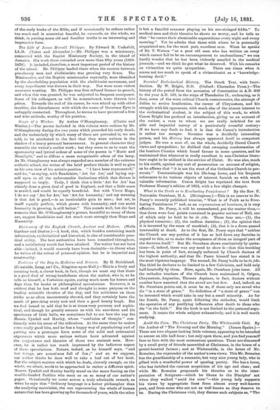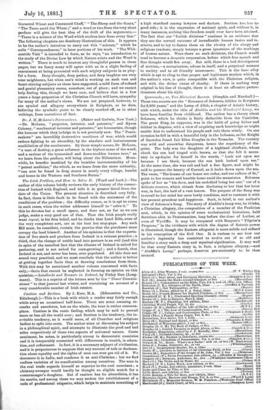Amid the Corn. The Christmas Party. The Whitsuntide Visit. By
the Author of "The Evening and the Morning." (James Speirs.)— These are two elegant-looking little volumes, appearing to be intended to amuse an idle half-hour ; but only open them, and you find yourself face to face with the most momentous questions. These are discussed' by a small party of friends assembled at Christmas, in the house of a genial-hearted farmer ; and at Whitsuntide, in the house of Mr. Romaine, the expounder of the author's own views. This Mr. Romaine- has the guardianship of a romantic, but very nice young lady, who is gifted with a wonderful power of quoting poetry. She has a lover, who has imbibed the current scepticism of his age and class ; and while Mr. Romaine propounds his theories as to the inter- pretation of Scripture—which he likens to the Disciples' act when they walked "amid the corn' —this young lady supports his views by appropriate lines from almost every well-known poet, and from some who are not as well known as they deserve to be. Daring the Christmas visit, they discuss such subjects as, "The Garnered Wheat and Consumed Chaff," "The Sheep and the Goats," "The Tares amid the Wheat ;" and a word or two from the very short preface will give the best idea of the drift of the arguments,- ' There is a science of the Word which evolves love from every line." The following chapters are desultory illustrations of this. It appears to be the author's intention to carry out this "science," which he "Correspondences," in later portions of his work. "The Whit- suntide Visit" is intended to form, as he says, "an introduction to the study of the Divine Law by which Nature exists and the Word is written." There is much to interest any thoughtful person in these pages, but we fancy many will agree with us in a slight feeling of resentment at being presented with such mighty subjects in so play- ful a form. Deep thought, deep pathos, and deep laughter are very near neighbours, but when one's mind is working on such vast and heart-stirring subjects as those here suggested, a mild form of refined and genial pleasantry seems, somehow, out of place ; and we cannot help feeling this, though we have now, and believe that in a few years a large proportion of the Christian Church will have, sympathy for many of the author's views. We are not prepared, however, to see symbol and allegory everywhere in Scripture, as he does, believing the symbolic parts to be clearly marked off, as in other writings, from narratives of fact.



































 Previous page
Previous page